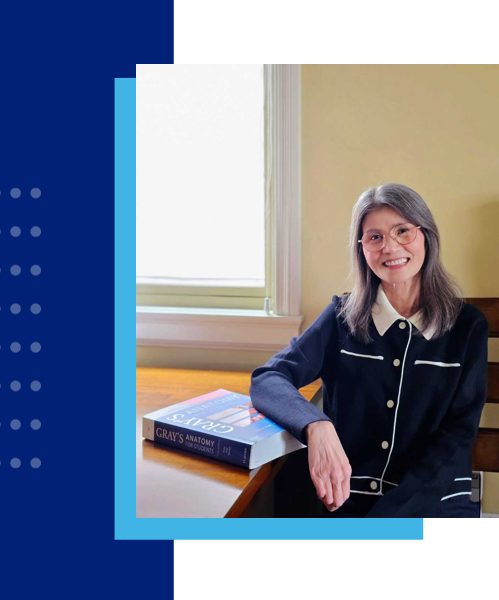

BIOCAPS Spotlight
Dr. Lien Vo
Lecturer and Prosector
Dr. Lien Vo started her studies in 1982 at the University of Medicine and Pharmacy in Ho chi Minh city, Vietnam, earning two degrees and a certificate. She holds a Medical Doctor degree in the General Surgery Specialty, a Master’s degree in the Medical Surgery Specialty, and a certificate of Advanced Medical Sonography. She also obtained a Certificate of Medical Sonography from the Ministry of Health in Vietnam in 1993. Before coming to Canada, she was a Urologist at the Department of Urology and the head of the Genito-Urology Tuberculosis Unit in Binh Dan Hospital in Ho chi Minh city, Vietnam from 1988 to 2002. Upon her arrival in Canada, she took on the role of a teaching assistant for a year in the Gross Anatomy Lab and served as a Problem-Based Learning Tutor at the University of Northern British Columbia. In 2007, she joined UBC as an instructor in both the Gross Anatomy Lab and the Neuroanatomy Lab. Dr. Vo’s involvement in teaching expanded in 2009 when she became a Problem-Based Learning and Case-Based Learning Tutor. In 2013, she started her role as a Prosector in the Department of Cellular & Physiological Sciences. She is currently a full time Lecturer and Prosector in the Department of Cellular & Physiological Sciences, the University of British Columbia.
Dr. Lien Vo’s Master’s degree thesis examined kidney failure secondary to kidney stones. Her other research interests include:
- the role of sonography in early detection of urologic congenital diseases in children
- Pyeloplasty in surgical repair of Ureteropelvic junction in pediatric patients
- Reconstruction of ureteric stricture due to tuberculosis
- Genital tuberculosis
Dr. Vo’s prosections are the standard by which all prosections are judged.
Dr. Edwin Moore, Professor
What first motivated you to pursue your career?
After being diagnosed with an autoimmune disease at the age of 12, I spent many years in the hospital for many years. There, in the setting of post-1975 Vietnam, I experienced firsthand the hardships of being a patient and witnessed the challenges doctors must overcome to provide care in a resource-limited system, inspiring me to pursue a career in Medicine. Following 14 years as a urologist in Vietnam, I left my career behind to immigrate to Canada at nearly 40 years of age. Once I arrived, I yearned to find a job that would allow me to make use of my existing skills and help me integrate into this new society. When Medical school in UBC expanded in 2007, my husband encouraged me to apply for a position. To my pleasant surprise, I soon received an offer to join the Faculty of Medicine as an anatomy and case-based learning instructor, a position I have held since then.
What excites you most about teaching university students?
I really enjoy teaching CBL. As a facilitator, the tutor observes the group and asks guiding questions to help the students unfold the case by themselves. Each year, I am continually impressed by the intelligence and curiosity of the students, and it encourages me to read around the cases in greater detail. What excites me most is when the students bring up thoughtful questions, as I often find myself learning something new from their discussions.
What are some of the most memorable moment in your career?
The most memorable day in my career in Canada so far is September 20, 2013, just 4 months after I started working for the Faculty of Medicine as a prosector. That day, the esteemed Dr. Wayne Vogl praised my dissection skills and demo cadavers in front of 300 first year medical and dental students, and he also passed these comments along to our associate Dean and Department Head at the time. It meant a lot to me, as it validated all my hard work in overcoming language barriers and health challenges to establish a career in Canada.
Could you share some of challenges you faced during your career and how you overcame them?
As a person with rheumatoid arthritis, working with my hands has been a major challenge for me. In my first few years working as a prosector, I experienced frequent flares due to the stress of trying to navigate a new job. There were many times where I considered giving up, but ultimately I decided to stay with this job as I had truly fallen in love with it. Through the support of my rheumatologist, physiotherapist, occupational therapist, I learned how to protect my joints and maintain a healthy work-life balance. I also sought the advice and mentoring of my colleagues in the Department of Cellular & Physiological Sciences, who helped me improve my dissecting skill. With their support and that of my family, I was able to overcome these challenges and remain in this job for over 10 years. At present, I am truly happy in my work and currently a sustained period of remission.
What do you enjoy when you are not working?
Reading, cooking and café hopping in different places around the world. However, my favorite type of coffee remains Vietnamese coffee.
What are your long term goals or aspirations within your academic and teaching career?
I hope to make a lasting contribution to the Body Donation Program, so I am in the process of preparing 3 special prossections which will take me at least 5 years to complete. These include prosections of the entire nervous system with somatic and visceral plexuses, Ganglions on the head and the skeletal with all the ligaments of the joints intact.
Dr. Vo is a skilled prosector and has produced some of the best dissections that I have ever seen. Her dissections of the brachial plexus and of certain regions in the head and neck are masterpieces of anatomy.
Dr. Wayne Vogl, Professor Emeritus